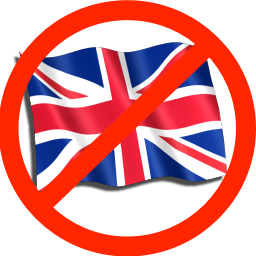Lesson 1: Giving King George the Finger
 Tuesday, February 19, 2019 at 9:10PM
Tuesday, February 19, 2019 at 9:10PM  In 1776, America was a sparsely populated settlement consisting of 13 colonies on the east coast of what is now the United States. There were only 2 ½ million people occupying these colonies from New Hampshire in the north to Georgia in the south. That’s roughly the population of Houston, Texas. Most colonists were immigrants from western Europe and their descendants with the plurality being from England.
In 1776, America was a sparsely populated settlement consisting of 13 colonies on the east coast of what is now the United States. There were only 2 ½ million people occupying these colonies from New Hampshire in the north to Georgia in the south. That’s roughly the population of Houston, Texas. Most colonists were immigrants from western Europe and their descendants with the plurality being from England.
By contrast, it’s estimated England’s population was somewhere around 7 million. More importantly, England was imperialist with colonies spanning the globe and by far the most powerful nation on Earth at the time. King George III considered America to be England’s property. Consequently, he treated America like all his subjects. He levied taxes, installed governors, appointed judges and occupied the colonies with English soldiers.
So let’s imagine for a moment that you’re a typical American colonist in 1775. You were born in, say, Virginia in 1750. Your parents immigrated from England in 1740, but you’ve never been there. Your parents left England as young adults because they are Puritan and wished to come to America to freely practice their religion without persecution from the Church of England. You are a tobacco farmer who carved your small farm from the wilderness with your own two hands. You struggle to survive and support your young family through brutal winters, drought-ridden summers, typhus outbreaks and a host of other hardships. (Remember, I’m inventing your fictitious life, but it’s one typical of colonists in 1775.)
King George III, in an attempt to placate his home subjects’ appetite for tobacco and further enrich England has just fixed the price of tobacco at a level that makes it impossible for you to feed your family. You and your neighboring farmers protest this onerous rule to your local magistrate, an English appointee who sides with King George. You are now faced with a family who may starve or die from disease, unsympathetic government officials and English soldiers collecting your taxes at gunpoint.
Some similar version of this story was common to hundreds of thousands of American colonists in the late 18th century. The colonial leaders of the time are who we’ve come to know as our founding fathers. Among these men were Thomas Jefferson, Benjamin Franklin, John Adams and John Hancock. The American colonists they represented in the Continental Congress were certainly giving them an ear full. There were still many loyalists who felt the safest course of action was to obey King George, but in the end supporters of independence won out and on July 4th, 1776, fifty-five members of the Continental Congress (unanimously) signed America’s most coveted document, the Declaration of Independence and dispatched it to England. The content of this document is the subject of the first couple of lessons.
I’ve provided the text of the declaration here. I encourage you to read it and pass it on to your friends. It is, by far, the most salient argument for the founding of our free nation. Thomas Jefferson is generally believed to be the author, but I suspect he probably penned the first draft and the final revision was the product of a consensus of many of the founders. The fact is, no one knows for sure. Whomever the author, I think it is the most eloquent, succinct document ever written. I still get chills when I read it.
The first line of the second paragraph is, by far the most well known and will be the subject of this lesson.
“We hold these truths to be self-evident, that all men are created equal, that they are endowed by their Creator with certain unalienable Rights, that among these are Life, Liberty and the pursuit of Happiness.”
This one line does more to define what the United States is about than any document written before or since. Let’s examine.
“We hold these truths to be self-evident,…
Here, the founders are saying that everything to follow is absolutely undeniable. These “truths” are as certain as the sunrise. No argument against them is valid.
“…that all men are created equal, that they are endowed by their Creator with certain unalienable Rights,”
Wow! This is the first thumb in King George’s eye. The very idea that all men are created equal flies in the face of the very idea of a monarchy. The entire English system of title just got swept under the rug. Think about it. If all men are created equal, then King George is no better than the blacksmith down the street or the sailor swabbing the deck. The same goes for the Dukes, Duchesses, Lords and any idea of title at all. Equality is a well-known concept today, but in 1776 this was radical thinking indeed.
Next, these equal persons are all given their rights by God, not by decree from some monarch. This would have been unheard of in those days where the popular thought believed in the divine right of Kings. In other words, God endowed the King and the King then passed out rights and privileges as he saw fit. Not only did our founders disavow that notion, they decreed that God endowed all people with “unalienable Rights”, meaning these rights cannot be taken away or given away. They come as part of the human package.
“…that among these are Life, Liberty and the pursuit of Happiness.”
A person’s life is his/her own. Government has no right to deprive someone of their life or their freedom. As natural as this sounds to us now, in the late 18th century this was a bold, new concept. European rulers of the day would typically imprison or kill their own subjects regularly for a whole host of reasons, but primarily to remove political opposition. Political dissent would often result in dissenters disappearing, being publicly executed or spending the rest of their lives in prison.
The last right spelled out in the declaration was then and is now unique to the United States, “the pursuit of Happiness.” Imagine that. The founders believed in everyone’s right to do what makes them happy! To this day, no government on Earth embraces this value to the extent they codify it in their official documents. Only Americans have a government founded on the concept that the quest for joy is a basic human right.
If you take nothing else from this series, you will at least have some understanding of the mindset of the men who dared to tell their ruler, “Leave us be. We reject your rule and have no need for you or your monarchy. We’re going to try something completely different. We will rule ourselves!” They made this declaration knowing full well the consequences, but believed in the idea of the United States so strongly they were willing to face the wrath of the world’s most powerful nation to secure our independence.
No matter what your spiritual beliefs, you must admit our founders were the exact men needed at exactly the right time in history. I tend to think divine intervention played a major role, but that’s just my opinion. Divine or not, the fifty-five men who signed the Declaration of Independence staked their lives on the belief that the United States was worth the risk and would ultimately prevail. It was the equivalent of signing their own death warrant. Can you think of ANY modern-day politician that would do the same?
More on the Declaration of Independence to follow in Lesson 2.




Reader Comments